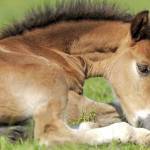Feeding Warmblood Horses

Properly managed, warmblood horses pose few nutritional challenges. Two important considerations are carefully regulating growth in young horses and maintaining moderate body condition in adults.
The primary goal for those managing young warmbloods should be ensuring slow, steady growth to reduce the risk of developmental orthopedic disease. Warmbloods are particularly prone to osteochondritis dissecans (OCD), a growth-related condition characterized by failure of cartilage to mature normally. Improper cartilage development can compromise joint function and can lead to lameness.
Young, growing warmbloods
Overfeeding concentrate feeds, which are usually abundant in sugar and starch, and maintaining horses in an overconditioned state are known to increase the risk of OCD in Thoroughbred foals, and the same is probably true in warmbloods. Scientists theorize that excessive insulin may alter the balance of hormones necessary for proper cartilage maturation. As a solution, low-glycemic feeds have been introduced into the marketplace. Low-glycemic feeds supply energy through several sources, including fat, fiber, and starch. Traditional feeds, on the contrary, use starch as the primary energy source. The goal is not to eliminate all starch from the diet. Rather, the goal is to provide a variety of energy sources.
Young warmbloods with access to high-quality hay and pasture might not require typical concentrates in order to maintain body condition. These horses should be offered a balancer pellet to ensure proper intake of protein, vitamins, and minerals if recommended levels of a fed are not necessary to maintain body condition. Insufficient intake of certain minerals such as calcium, phosphorus, copper, and zinc has also been indicated as a risk factor for OCD.
Mature warmbloods
When managing adult warmbloods, a chief concern is keeping them at optimal body weight. Mature warmbloods are often easy keepers, and without proper care they tend to become overweight. As with most other horses, warmbloods should be fed a diet consisting largely of forage such as pasture or hay.
If horses perform moderate to extensive amounts of work, they might need a fortified concentrate to satisfy their energy demands. Strict attention should be paid to the manufacturer’s feeding guidelines; if the recommended amounts of the feed are not given daily, horses may not consume sufficient levels of vitamins and minerals. When horses consume less than recommended daily amounts of a feed, a balancer pellet should be added to increase fortification.
Some warmbloods may not require any concentrate, regardless of their workload. If this is the case, they should be fed an appropriatebalancer pellet or vitamin and mineral supplement daily. A broad-spectrum supplement containing easily digested nutrients such as chelated minerals will ensure the horses’ nutrient needs are satisfied.








